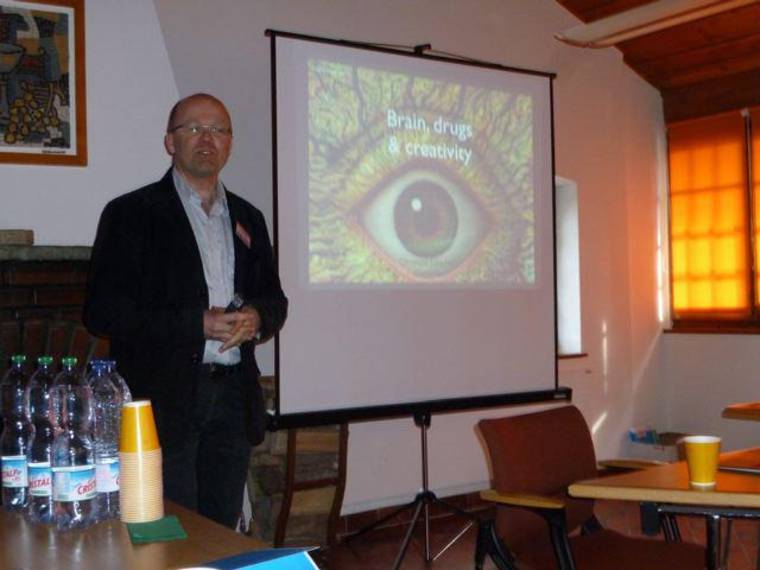Creative-Critical Approaches to Adaptation and Making the Medieval Modern, by Olivia Biber
This day-long event was organised by Kristen Haas Curtis, MA (University of Bern) and Prof. Mary Flannery (University of Bern). The workshop was designed with a double-aim in mind: a) to introduce attendees to approaches that combine creativity and critical thinking and b) to provide a setting in which attendees could experiment with the methods introduced by engaging in their own creative-critical adaptions of medieval texts. In addition, the workshop also provided a platform for participants to think through and work on how they introduce themselves and their projects in different contexts and to different audiences.
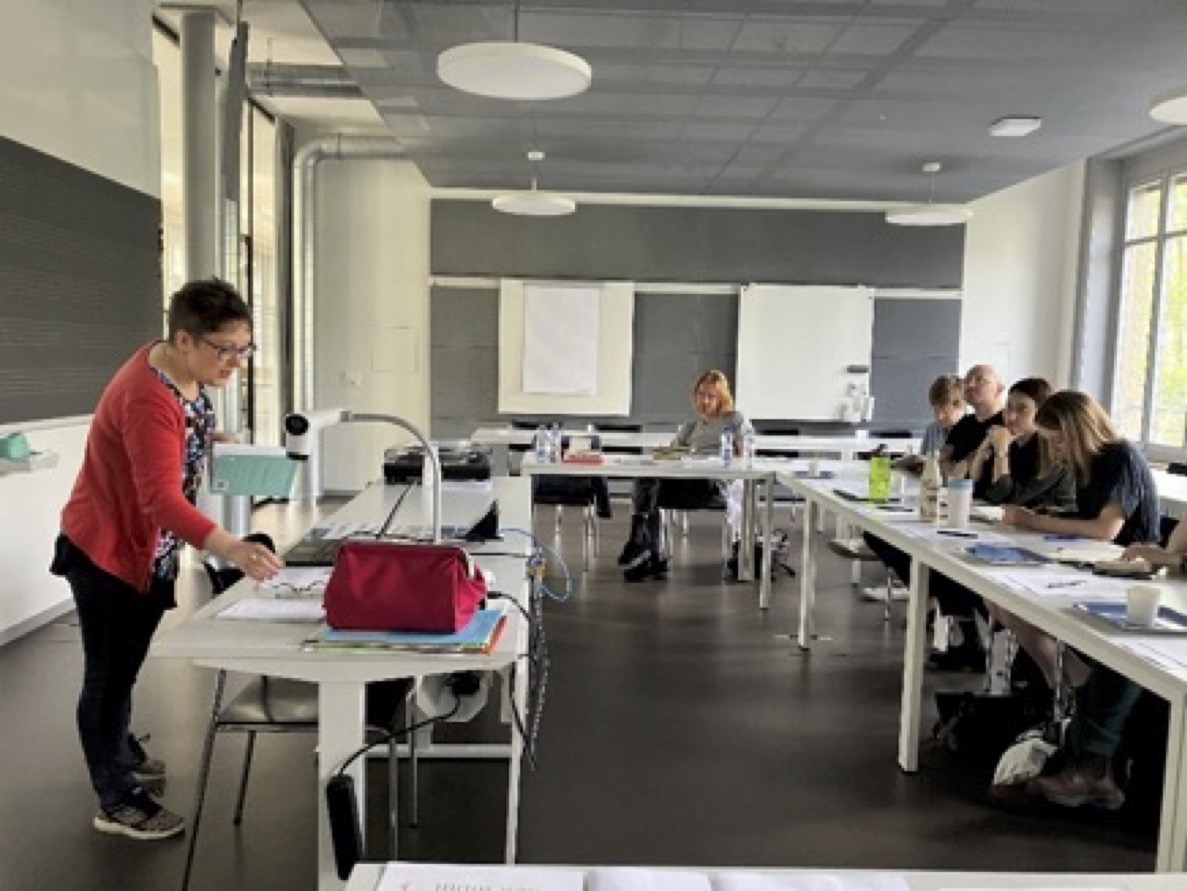
The workshop started at 9.00am with coffee, pastries and fruit provided before the attendees were very warmly welcomed by the organisers. The first of four sessions consisted of a lecture each by the invited guests Dr. Laura Varnam (University of Oxford) and Zach Weinersmith (author and cartoonist) in which they discussed different approaches to adapting the medieval text Beowulf. While Varnam’s talk detailed various ways in which poetry can be used in adaptation, Weinersmith focused on the role and function of cartoons in adaptation. These lectures were each followed by a round of discussion in which the participants were able to ask questions which created a lively and engaging atmosphere. The second session consisted of a hands-on workshop led by Varnam and Curtis in which the participants first learnt how to write haiku based on a medieval text read in preparation for the day, before then creating a cartoon based on one of the haiku produced.
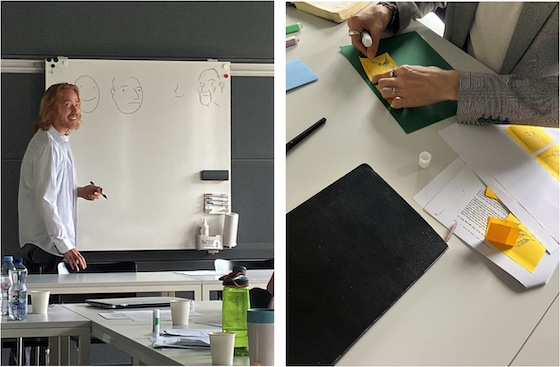
After lunch, which included ample opportunity to continue the conversations started earlier in the day, the workshop continued with the second hands-on session led by Flannery and Weinersmith. Through short exercises, the participants were introduced to humour and satire and how these can be used in creative-critical responses to (medieval) texts. In both hands-on sessions, the participants were eagerly exploring and experimenting with the tasks and exercises set by the session leaders while also thinking about how to include these in their own pedagogy; lively discussions ensued where people felt comfortable to step out of their comfort zone and embrace not striving for perfection as a mode of work. The final session provided a chance to practice how participants introduce themselves and their work in different contexts and to different audiences, which is a vital skill that can rarely be practiced in a ‘low-stakes’ setting. Consequently, participants highly welcomed this opportunity and appreciated the feedback given. The day concluded with a short round of reflection, which brought a highly stimulating and engaging workshop to a close.
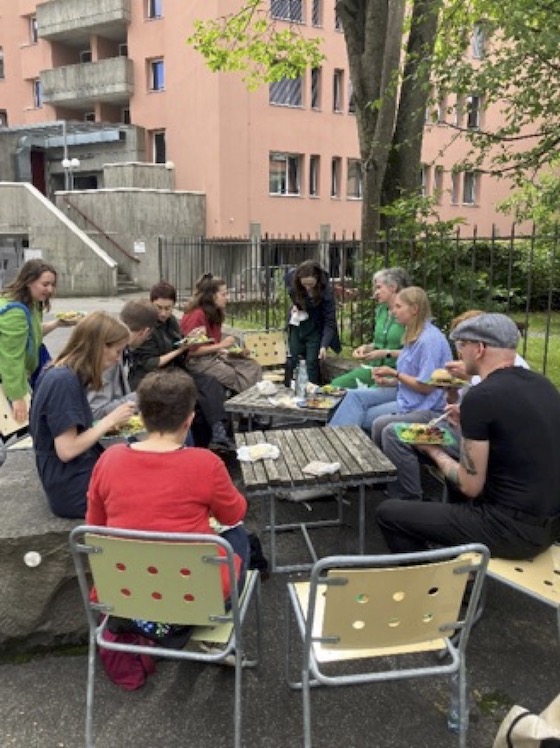
CUSO Event Report: Geneva, May 17th – The Literary Life in Recycled Books (1500-1700): A report by Anne-Elisabeth Donzé
This CUSO event, organized by Prof. Guillemette Bolens, Prof. Lukas Erne and Ms. Emily Smith, was held on the 17th of May in Geneva. The workshop was centred around the history of books and our perception of the material text. Invited speaker, Prof. Adam Smyth from the University of Oxford, first gave a lecture on the ‘literary life of recycled books’ from the Early Modern English period. Through various fascinating examples, he made us rethink the form and survival of printed material – notably a very interesting reuse of parts of King James’ Bible, found as ‘waste’, often in the binding parts of other later texts. Other examples were fragments from Cicero found in Shakespeare’s First Folio, a pamphlet from 1620 contained in a box, or even certain texts which only survived as part of waste in other printed works. With such materials, the question therefore is how to proceed in our understanding of a printed text, what do these patched works construct and how do they work together, how do they live on? As we live in a time heavily embedded in environmental problematics, the interest in the Early Modern way of print, in the culture of recycling, appears particularly relevant.
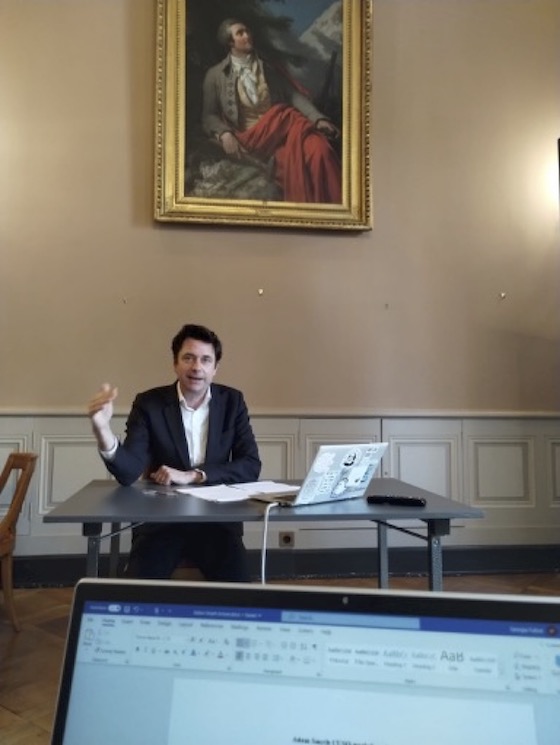
After an engaging conversation on the use and on our understanding of recycled printed sources (or non-printed – as part of the audience also works on medieval manuscripts, one indeed wondered what the practices were with those materials), most participants attended lunch, during which we attempted to avoid ‘creating’ any waste from the nice but large meal served.
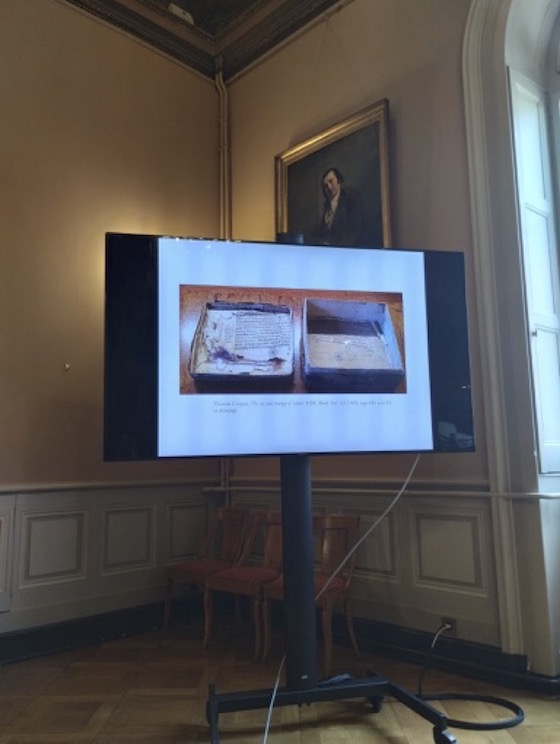
In the afternoon, during the second part of the day, Prof. Smyth led a workshop on material forms of writing, focusing in particular on juxtaposing Early Modern productions with contemporary ones, and on how to think of intertextuality. Four main pairs of unusual texts were at the centre of our discussion. For instance, the Early Modern deletion of text as a form of writing, with the very fascinating use of ink to erase the word ‘pope’ from books, a word which nevertheless remained visible to the reader’s eye. A deletion of text, voluntarily this time, echoed in a contemporary work, Tom Phillips’ ‘A Humement’. Other such non-traditional forms of writing were discussed among the participants, leading us to question once more the purpose and history of a text, and how those experimental forms of writing led to different ways of reading and of interpretation. Many thanks go to the organisers and the guest for the lovely day!
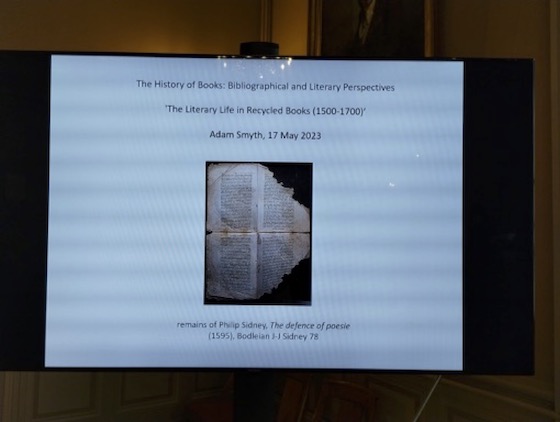
CUSO Event Report, Geneva (Nov 10th ), by Chen CUI
On November 10th, 2021, the CUSO event on “Animating Books: Rethinking Book History” – organised by Prof. Lukas Erne (UNIGE), Dr. Devani Singh (UNIGE), and Dr. Sarah Brazil (UNIGE) – was held in Geneva, where scholars in early modern literature, coupled with a few medievalists from the CUSO member universities gathered together to reflect upon the study of book history in our era.
Our distinguished guest speaker, Professor Jennifer Richards (Joseph Cowen Professor of English Literature at Newcastle University) came to Geneva to share with us her exciting ideas about book history. Despite the ongoing, yet mitigating pandemic situation, and regardless of the unexpected railway incident which made it rather hard to reach Geneva, this CUSO activity has attracted participants ranging from university professors, lecturers, doctoral candidates, to MA and BA students reading early modern English literature. Both Prof. Richards’ lecture and the following workshop led by her have turned out to be a great success – informative, in-depth, and absolutely enlightening.
A welcome lunch was arranged for Prof. Richards at the Restaurant Italia, which was also open to doctoral and postdoctoral researchers – an occasion where some of our participants and our guest speaker got to know each other shortly before the academic sessions.
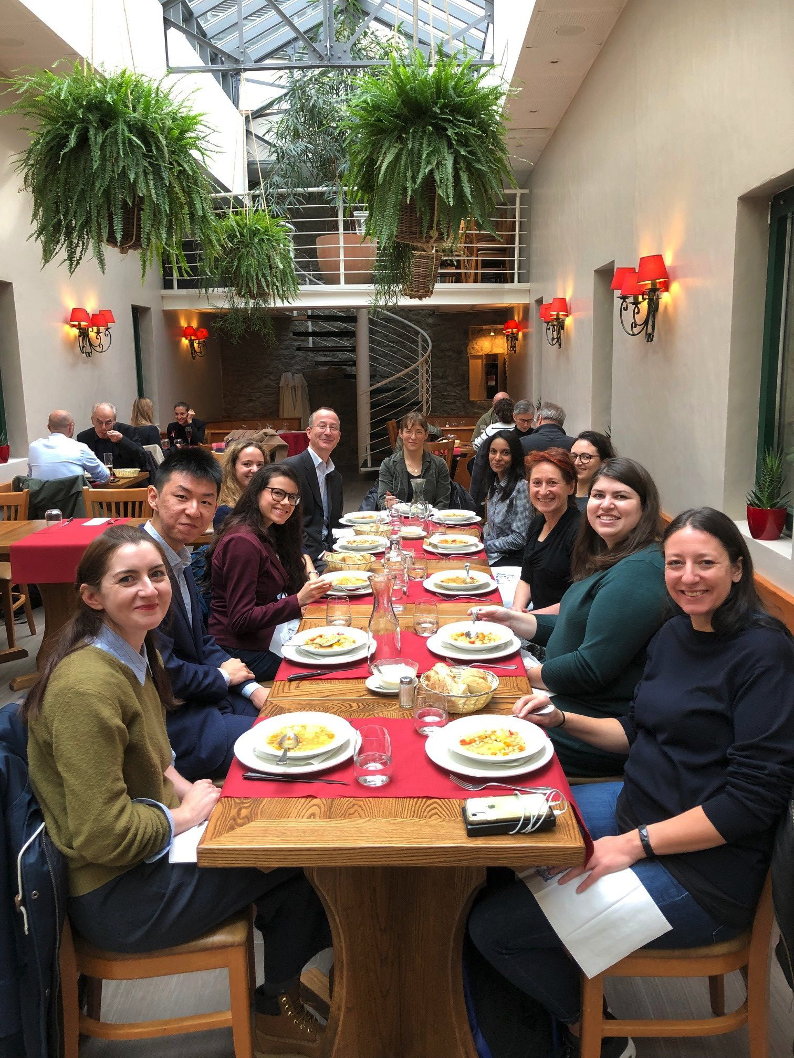
At around 14:15, Prof. Richards delivered her lecture to the public in Bâtiment des Philosophes, which was divided into two parts, themed respectively on recovering the voice in early modern England and editing books in the contemporary digital age. Knowing that some undergraduate students currently reading John Milton with Prof. Erne were to attend her lecture, Prof. Richards particularly selected an excerpt from Book II of Paradise Lost as a case study concerning Milton’s writing of sound to cater for these students’ curiosity.
In the first part of her lecture, Prof. Richards introduced to us the reading culture in early modern England, focusing on the interplay between silent reading and reading aloud throughout the 16th and 17th centuries, that is, against the background of the revival of classical rhetoric in Renaissance England. After a brief review of previous scholarship, Prof. Richards pointed out that the position of vocality in early modern reading culture still needs further exploring. Then, based on her study of the handwritings, signatures, marks and stains on some early printed books, as well as the annotations on the margins of certain textbooks intended for rhetorical training in early modern English grammar schools, Prof. Richards proposed that vocality must have played an important, yet understudied role in the composition and dissemination of writings, the spread of literacy, and elite education in early modern England. Prof. Richards argued that the teaching of articulation (pronunciatio) in Renaissance England is worthy of being examined in relation to the birth of modern science and the development of the modern self — or, human consciousness, to quote her own words. According to her, the emphasis on the oral (or, to be more exact, vocal) aspect of reading, as embodied by the ways how the English alphabets, tonal variation, and the arts of disputation were taught in early modern England in a way complicates our understanding of the epistemological transfer from hearing dominance to sight dominance during the English Renaissance. As Prof. Richards phrased it, print changed our reading habits, which is vividly manifest in the Renaissance fashion of index and typography, and it is particularly remarkable that the “silence of print” emerged concurrent with the shift from orality to vocality – the engagement of our vocal apparatus even in the process of silent reading, a process generally associated with individual readers’ rational thinking and inner transformation since the age of St Augustine.
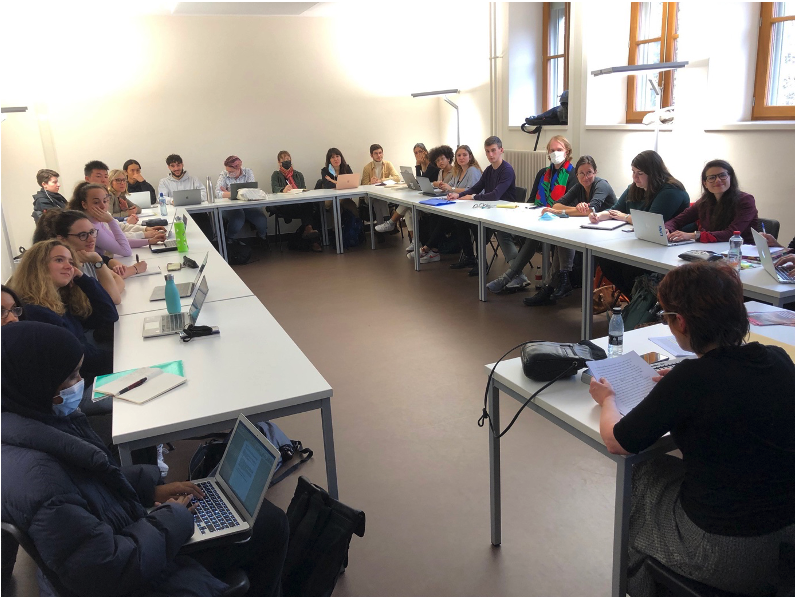
In the second part of her lecture, Prof. Richards led us to reconsider modern technology, especially the development of social media in relation to our reading practice nowadays, which intrigued not only our undergraduate audiences, but also doctoral researchers working in the digital humanities and materialities. After a ten-minute break, Prof. Richards answered a series of question from the public, ranging from the nexus between medieval monastic reading culture and its early modern counterpart, the reception of Seneca and Cicero in Renaissance English grammar schools, the significance of vocality in diverse literary genres, to the possible influence of Italian Renaissance madrigal upon the 17th-century English deployment of polyphony. The discussion was lively, flickering with intellectual sparks, and was ensued by a workshop in which Prof. Richards talked intimately and enthusiastically with interested scholars about her current project on editing Thomas Nashe’s The Unfortunate Traveller (1594). The attendants were highly curious about how the modernisation of early modern spelling and punctuation is being done in this particular project, as well as whether, or rather to what extent, the editor’s subjectivity could potentially result in some partial or imprecise understanding of the original. Dr. Elizabeth Kukorelly, for instance, keenly detected that the omission of parentheses in one of the cases provided by Prof. Richards could hamper the delivery of some implied connotations on the iconic level, which was taken as an excellent idea by our guest professor. Besides, our medievalists, Dr. Amy Brown (UNIBE) and Dr. Sarah Brazil (UNIGE), also shared their knowledge of medieval manuscript studies in response to the scholarly editing of early modern printed books.
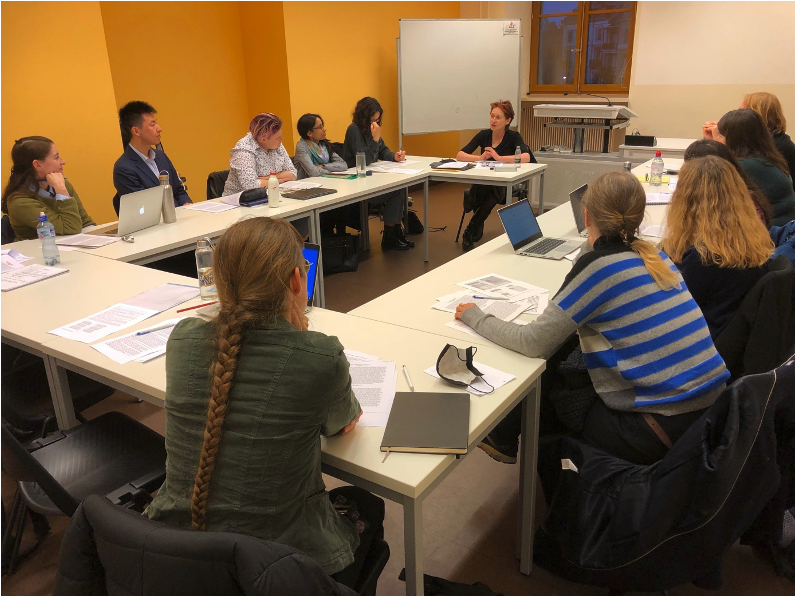
In every respect, this CUSO event has been a great success. We were deeply impressed by Prof. Richards’ erudition and passion for her research, and we all benefited much from the cross-disciplinary dialogue made possible by the CUSO.
CUSO Event Report: Literary Utopia / Dystopia (Online), 1st May 2021. A report by Andy Reilly and Emily Smith
Dr. Rachel Willie presented the first lecture of the day, entitled ‘Bodies and (e)motion in John Lyly’s The Woman in the Moon (1597)’. This lecture, which is based on Dr. Willie's current investigation into the early modern moon, took in a wide range of topics, including contemporary debates about heliocentrism, humoral pathology, and Cartesian philosophy. We were particularly struck by Dr. Willie's reading of Lyly's play as part of the controversy surrounding the Copernican Revolution and the move away from the Ptolemaic System's distinction between the heavy and gross Earth and the light and mobile stars and planets. By reading the character of Pandora as an ambiguous figure who both connects and complicates the connections between the two worlds, Dr. Willie convincingly argued that the play's misogyny is much more complex than it may at first appear.
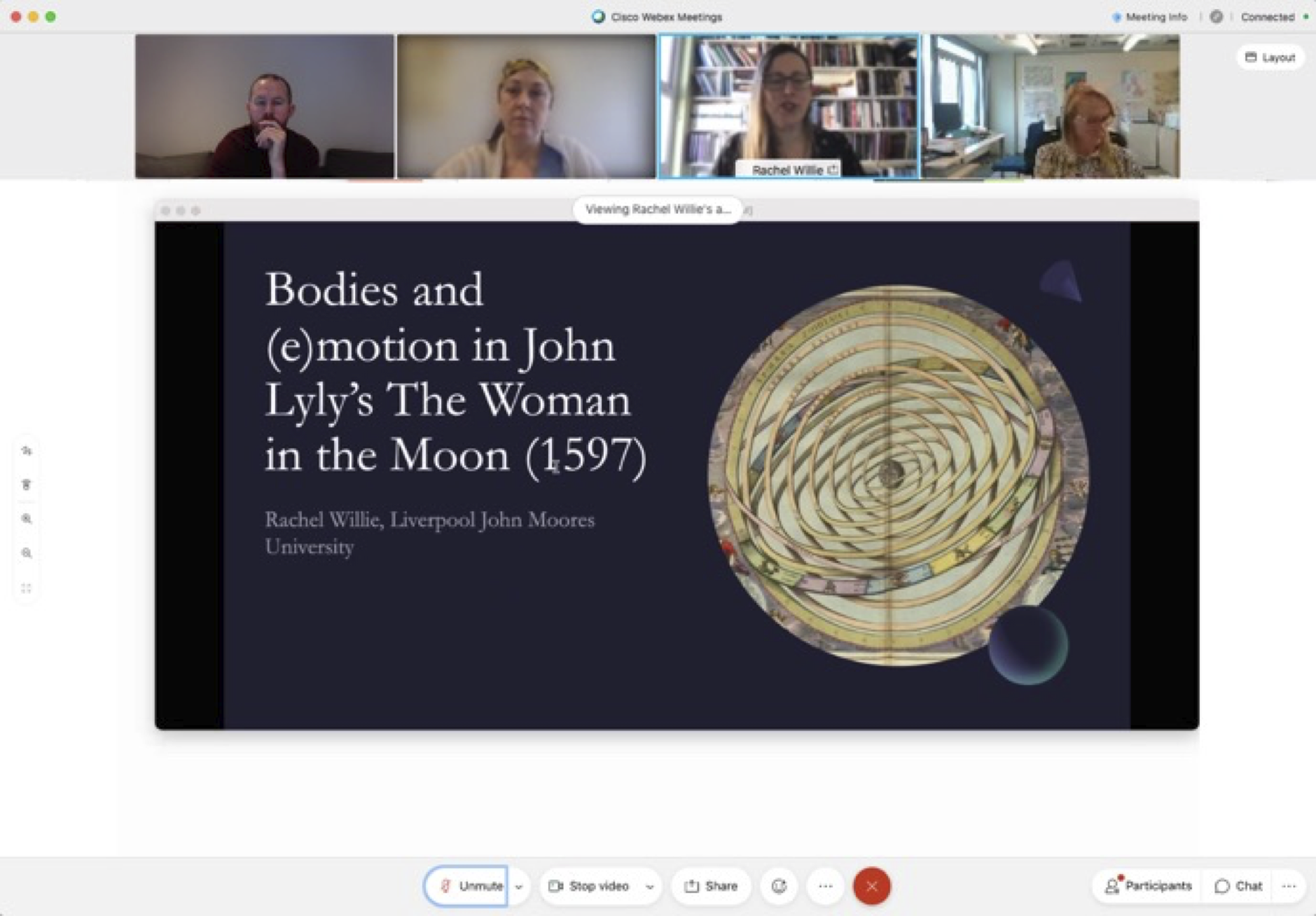
The second event of the day was a workshop led by Dr. Ben Parsons, entitled 'Utopian Bodies and Dystopian Flesh'. Based on a number of excerpts from pre-utopian and utopian texts by Antonio di Pietro Averlino, Thomas More, and Joseph Hall, this workshop gave us a valuable insight into the connections between utopian and dystopian spaces and conceptions of the body. We were first introduced to Sforzinda, Averlino's imagined perfect city, which was the first example of a perfect space imagined to be urban rather than a natural space, but which is described in a strikingly Vitruvian fashion. This was followed by a discussion of More's Utopia that took in a wide array of aspects including garments, the policing of the body, brothels, and marriage ceremonies. Finally, we were introduced to Joseph Hall's playful satire on the idea of the body politic in his description of Blocksfoorde and the vividly dystopian humoral city of Cholericoye, both of which push the idea of the city as a body to the extreme.
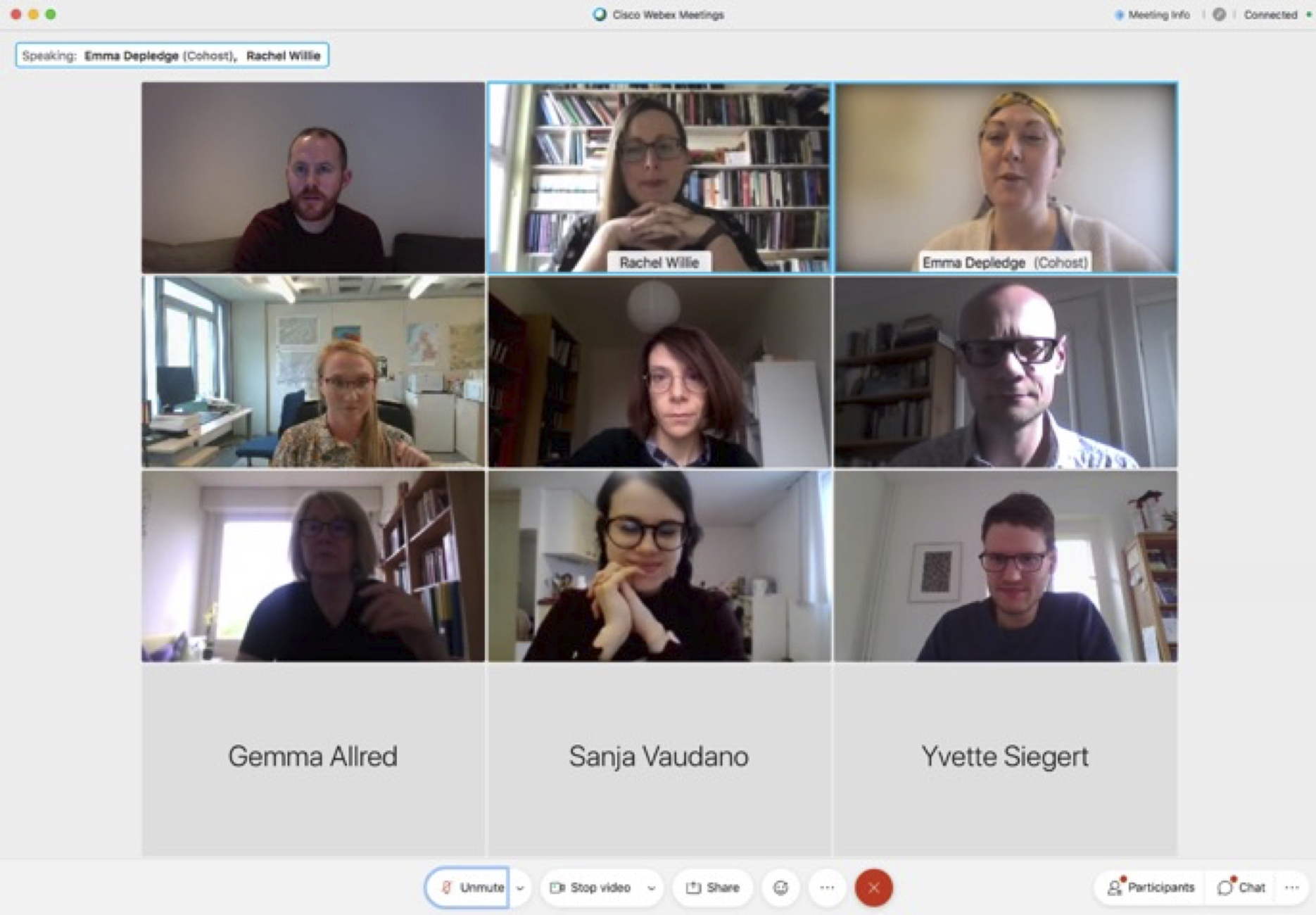
After a short break, we returned for the second workshop of the day, which was led by Dr. Rachel Willie and was entitled 'Irony and Travel'. Our discussion was based on an article from Dr. Willie's co-edited collection, Travel and Conflict in the Early Modern World, entitled 'Travel, utopia, and conflict: Patterns of irony in early modern utopian narratives', by Daniel Carey. Both the article and the group discussion introduced us to a number of key texts for Utopianists, some, such as The Tempest, that are more well-known, while others, such as Henry Neville's The Isle of Pines, and The Blazing World, by Margaret Cavendish, that were newer for some of us. A very useful and comprehensive shared overview of the field by the experienced Utopianists in attendance gave the rest of us a clear understanding of the state of current Utopian research, as well as providing a number of "must-reads" for our personal reading lists.
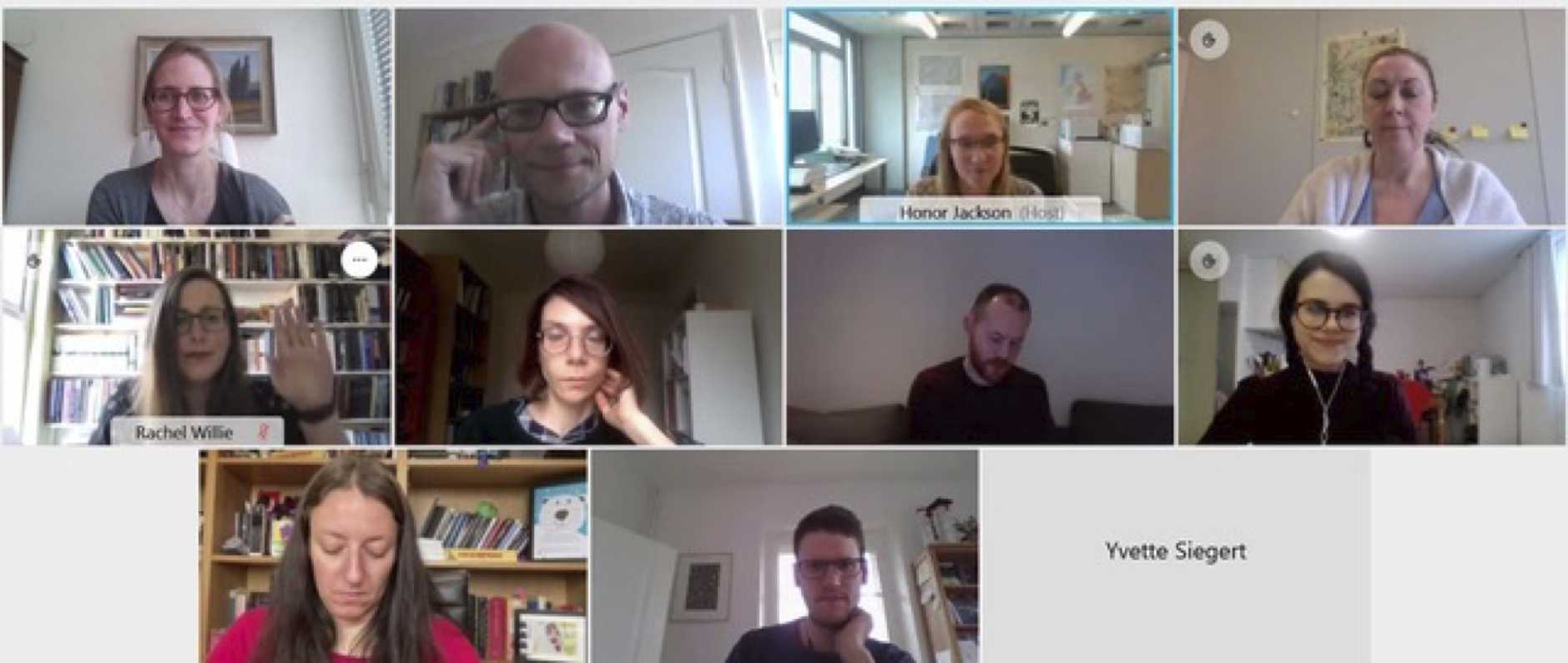
After breaking for lunch, we made use of the website, wonder.me, to take part in an impressively realistic group chat, all to the backdrop of a suitably Utopian beach scene. Despite being spread geographically around the world and connecting through our computer screens, this gave us the opportunity to discuss a range of topics related to our research and other interests in a social setting. We're sure many participants also took note of this website as a valuable tool for use in future online classes!
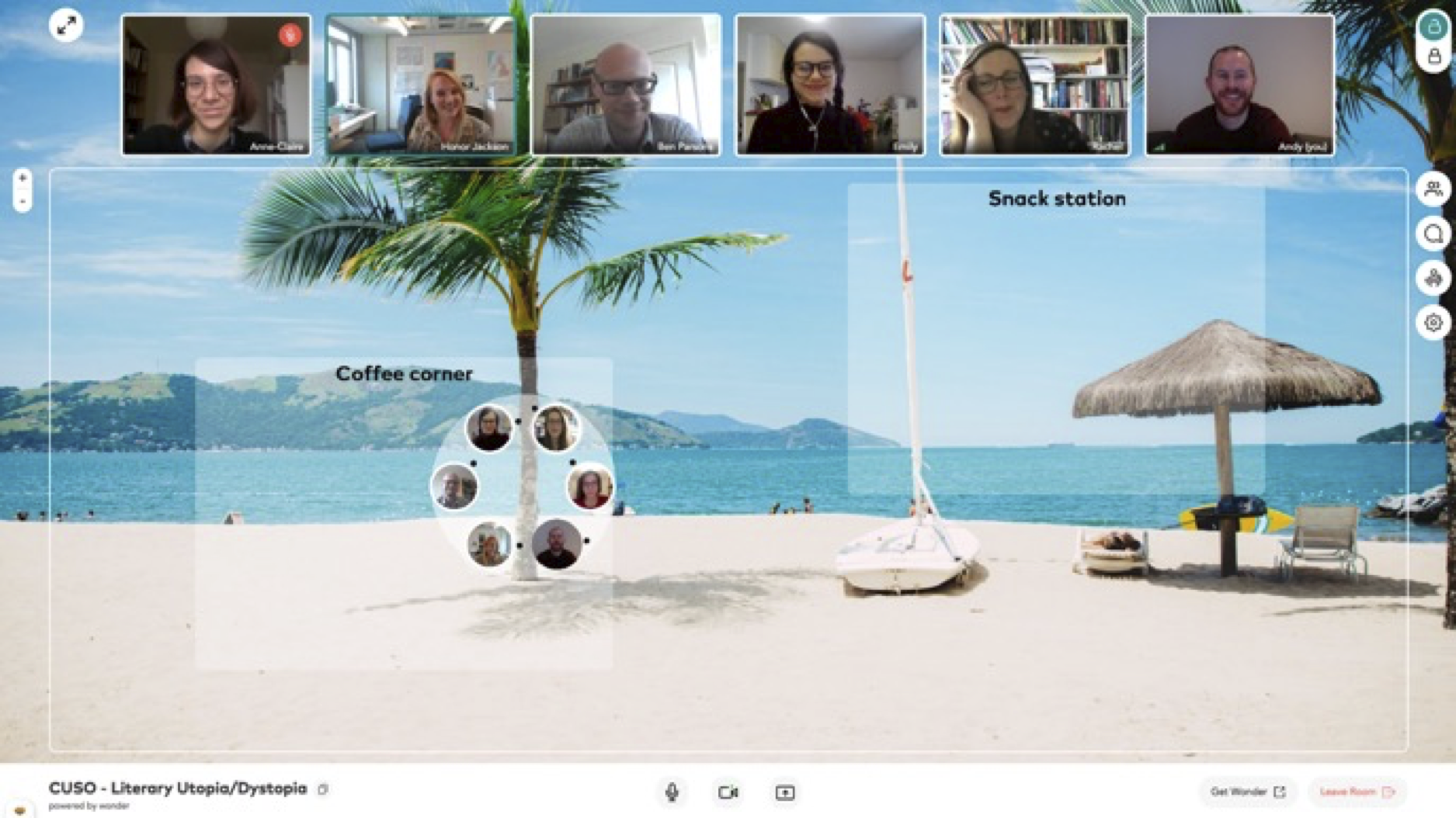
Following the networking section, Honor Jackson presented a work-in-progress paper entitled ‘Rewriting Utopia: Shakespeare’s The Tempest (1611) and Dryden and Davenant’s The Tempest; or The Enchanted Island (1667)’. Her presentation posed many interesting questions about the nature of the utopian references in Shakespeare’s The Tempest, whether the utopian narratives of either version of The Tempest threaten or contain threats to those in power, and the relation of female transgression to utopian ideas. We found her identification of an upsurge of utopian texts published after the Civil War and beyond, and discussion of their potential utility in this context, particularly fascinating – especially where she illustrated where Dryden and Davenant had “updated” Shakespeare’s text in the light of these evolving concerns.
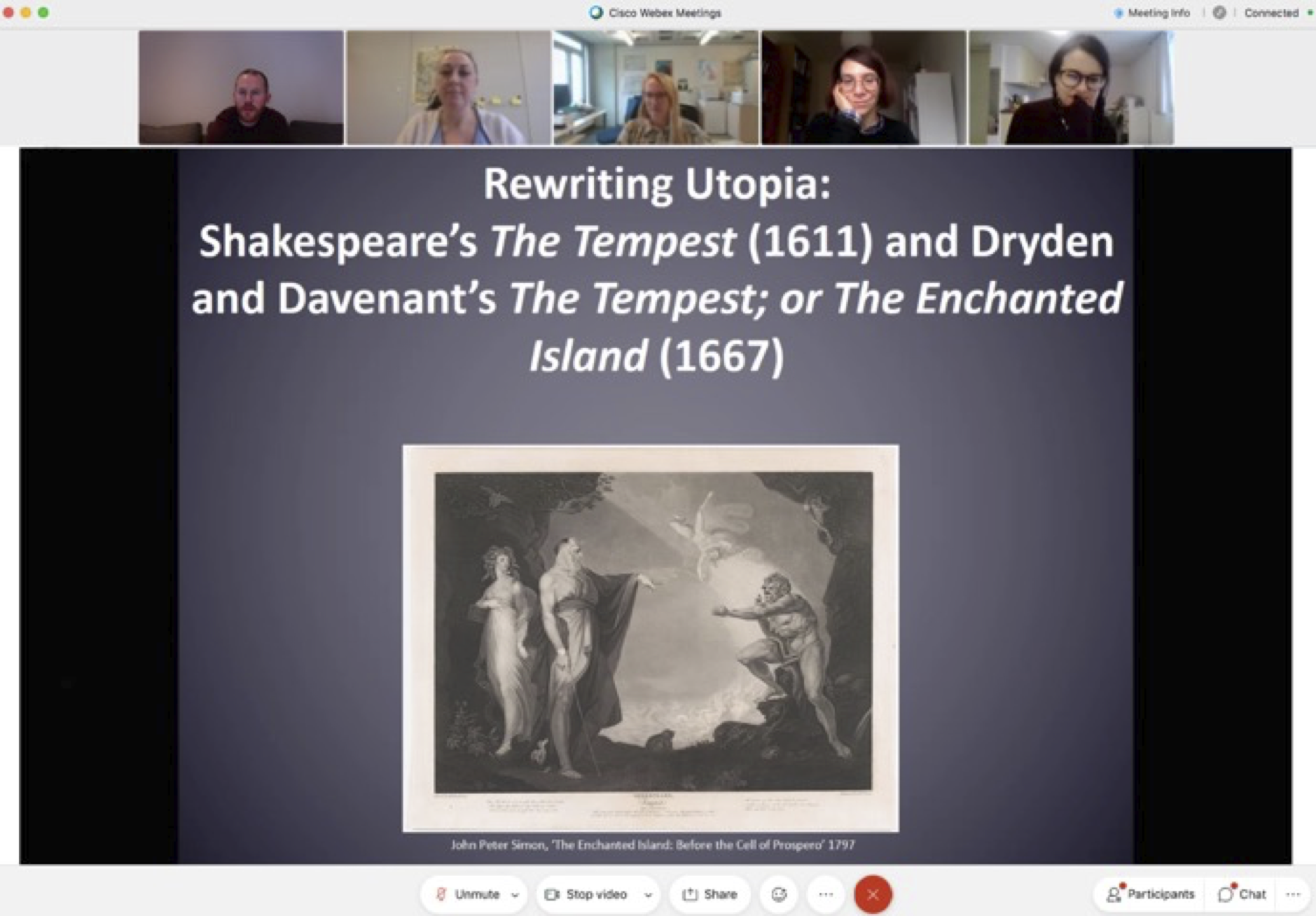
The second lecture was delivered by Dr. Ben Parsons, and entitled ‘Meaning Behind the Moaning: Ghost Stories in the Seventeenth-Century Popular Press’. Dr. Parsons highlighted the great revival of interest in ghosts in the chapbooks of late seventeenth-century England – a startling resurgence, given the cultural and religious changes which should have mandated against such popularity. In contrast to medieval ghosts, which were rendered comprehensible immediately by virtue of purgatory as an explanatory framework, Dr. Parsons’ paper suggested that the “inexplicability” of apparitions was their defining feature in the later popular press. He also noted the importance of considering these phenomena as dialogic: though breaking with past representations, the later ghosts recall these earlier traditions at the same time. Both papers were followed by lively question-and-answer sessions, providing some much-needed intellectual interaction in these times of relative isolation!
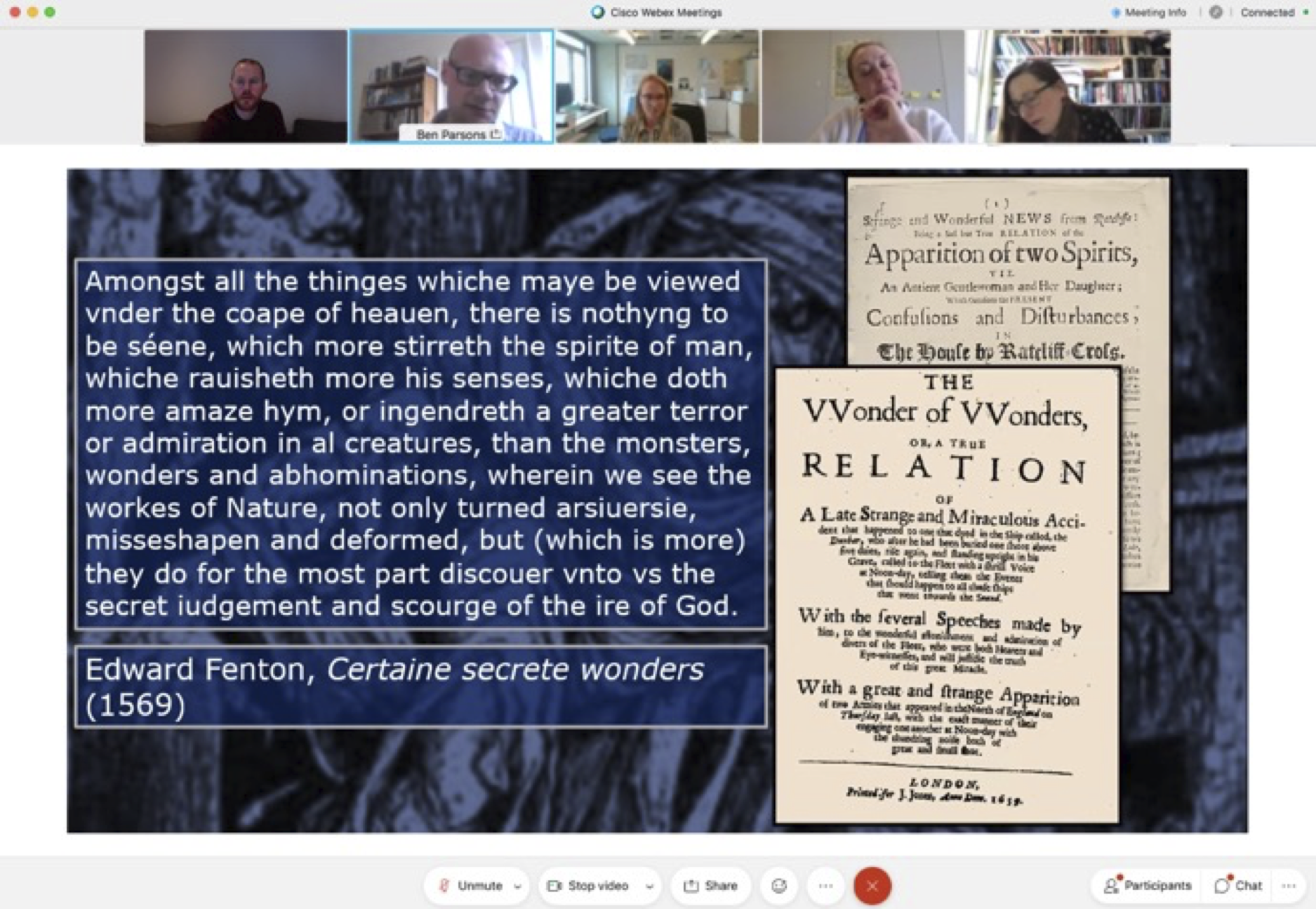
CUSO Report: Geneva (Online), 17th March 2021. A report by Emily Smith & Dr Nadine Weiss
It was a delight to have the opportunity to engage with Dr Katell Lavéant, whose online lecture ‘Folly as a Cement of Society: Joyful Culture in 16th-Century France’ – given on the 17th of March 2021 – was both stimulating and timely. Dr Lavéant opened by providing a useful overview of the types of joyful culture in medieval and early modern Europe, the sources from which we can garner evidence for social practices, and the common themes which run through these documented events. Of particular note was her consideration of how these sources contain complex, rather than unambiguous, portrayals of these societies and their practices.
She then turned to examine in detail one of these tensions: the representation of females in joyful culture. The complicated and often self-contradictory nature of female autonomy and its interpretation in these depictions was a key point of discussion. Her refutation of the notion that these sources, and the practices which they show, were ever univocal was particularly insightful. I found that the identification of nuance and tension within the instances which she presented especially struck a chord for me, and prompted consideration of the complex nature of social activity in both its original enactment and representation.
I particularly enjoyed the fact that the presentation was given as part of Guillemette Bolen’s BA seminar, ‘Arthurian Legends in Medieval England’, as this allowed for students to engage with research. It is clear that the participants benefited from this opportunity, as their interesting thoughts in the question-and-answer session which concluded the seminar demonstrated; their contributions included queries about research methodology and the religious dimensions of the texts, amongst many other topics, which clearly demonstrated that the session had been accessible and interesting for a student audience.
We were fortunate to then witness the stimulating discussions that resulted from this first presentation borne out in a new context in the ensuing CUSO doctoral workshop. Dr Lavéant here refocused her attention on joyful culture in the context of book materiality and the playful aspects that often ensue from joyful texts as multidimensional objects. Her lively discussion of the difficulties involved in defining the corpus of joyful literature had wide-reaching implications for anyone interested in the transmission and reception of material texts. Particularly striking was the intermediality of certain depictions from joyful literature which ranged from the recycling and adapting of certain woodcuts to painted depictions on architectural facades and sustained allusions ranging from Chaucer to the widely successful Harry Potter series. Especially illuminating was her discussion of how book history can prove an effective tool in assessing the use and circulation patterns that inform certain literary audiences, particularly in the context of genres of literature which entail a typically limited life expectancy. In the response section of the workshop a dynamic conversation ensued surrounding the orientation of certain woodcuts on title pages as well as much larger questions pertaining to the reception history and circulation of joyful literature.
Lavéant’s seminar was originally scheduled for the spring semester of 2020, but unfortunately cancelled due to the pandemic; however, it is to Dr Lavéant’s credit that the presentation was so engaging in an online format, and she must have done much work to facilitate this smooth transition!
Multilingualism in Medieval England – Lausanne, 29 November 2019. A report by Ana Rita Parreiras Reis
On Friday November 29th, I had the pleasure of attending the CUSO workshop on “Multilingualism in Medieval England”, organized by Dr. Rory Critten from the University of Lausanne. The morning started with a talk by guest speaker Prof. Ardis Butterfield (Yale), titled “Medieval Multilingualism in Early Songs from England: Godric and Friends”. This fascinating talk was structured around two main issues: the complexity of defining medieval English lyrics and the challenges that editors working on such a corpus face in their practice. Middle English lyrics, Prof. Butterfield argued, are not straightforwardly short, English, nor poetic, and defining them requires the acknowledgment of other contextual elements, such as the manuscripts that contain them, their multilingual contexts, and the music that does or does not accompany them. Although a strict definition might seem superfluous, the act of edition, Prof. Butterfield claimed, requires such a definition to be made. However, it is perhaps not a new definition of the Middle English lyric which needs to arise, but a new form of lyric editing, in which edition is thought of as a creative, interpretative, and critical exercise. Such considerations were then demonstrated through the captivating example of Godric of Finchale (c.1065-1170) and his songs, which encapsulate the complexity of editing Middle English lyrics.
After a short coffee break, we participated in a workshop led by Prof. Butterfield and entitled “Do We Mean Lyric or Song? New Approaches to Editing Medieval Insular Song”. This workshop provided a great opportunity for the participants to get a first-hand experience at digital edition of insular lyrics, and to be confronted with the set of questions arising from such practice: what does one do with trilingual lyrics in the context of an edition focused on Middle English lyrics? How does one present a complex and multi-faceted lyric in an undergraduate-friendly way? How does one digitally report intricate manuscript patterns which play a role in the poetic apparatus of the lyric? These and other questions were discussed in what proved to be a very thought-provoking workshop.
Following a relaxing lunch break at the Restaurant de Dorigny, we proceeded with the afternoon session, which comprised doctoral and post-doctoral presentations. The first PhD presentation was offered by Aurélie Blanc (University of Fribourg) and was titled “Watching and Participating in the Barking Abbey Elevatio and Visitatio sepulchri: Latin Drama or Medieval Liturgy?”. In this presentation, Aurélie Blanc offered an interesting overview of her on-going doctoral project and the challenge of defining the performative activities of visitatio and elevatio at Barking Abbey as drama, liturgy, or perhaps something in between. This presentation was followed by that of Sam Röösli (University of Bern), entitled “With a Nose in the Air: Latin and Old English Sensory Experiences of Bad Weather”. Sam Röösli offered a comparison between different representations of storms across Anglo-Saxon literature, stressing how differences in those representation in Latin and Old English works depend more on questions of genre than on language distinction. The last doctoral presentation was that of Matthias Berger (University of Bern), who talked about “The Nation and the Names of Things: Troubled Monolingualism in Medievalism”. In this talk, Matthias Berger discussed how questions of national identity interact with the idea of mono vs. multilingualism in two fictional works set in medieval times, Paul Kingsnorth’s novel The Wake, and David Greig’s play Dunsinane. The last presentation of the day was that of Dr. Juliette Vuille (University of Lausanne). Her talk, “Ménage à Trois in Machaut’s Voir Dit and Chaucer’s Troilus and Criseyde”, focused on the use of messengers and go-betweens in the aforementioned texts, and their roles in regard to the complexity of shaping and conveying emotions.
Overall, this CUSO day proved extremely thought-provoking, an occasion to reflect on the beauty but also on the critical challenges that come with working on the multilinguistic context of medieval England. The day was also a wonderful occasion to meet with researchers, to share and discuss ideas in a friendly and stimulating environment.
Geneva, 23 November, Accents on the Shakespearean Stage – a report by Honor Jackson, University of Neuchâtel
Professor Sonia Massai, a prolific scholar whose work on Early Modern Drama, Shakespeare, and performance history speaks for itself, is not only brilliant but warm, friendly, and funny and the CUSO workshop on the 23rd of November was therefore the most enjoyable one I have thus far attended. Beginning with a wonderful lunch attended by Doctoral Students from various universities in the CUSO group the tone was set as open, collegial and collaborative without any sense of hierarchy. Over a hearty Italian lunch (followed by much needed coffee) Professor Massai answered questions about her current work with enthusiasm but perhaps more noteworthy was her equal enthusiasm to talk about our own research interests and answer burning questions about our own career paths. She spoke about the practical skills that early career scholars need to attain to enter into the world of editing and noted that, whilst we must be experts in the field in order to edit, in the end the definitive text does not and cannot exist and encouraged us to think of that as a liberating starting position for any editorial work. Further, colleagues noted how refreshing it was that alongside these more serious topics the lunch conversation was full of joking, personal anecdotes, many many puns, and a general sense of easiness which everyone could enjoy.
From here we moved to the lecture hall which, at fifteen minutes before we were due to start, was already full, and kept on filling up. The organisers quickly sourced additional chairs, moved desks, and found a way to accommodate the huge crowd who had come to hear Professor Massai speak. She did not disappoint. What followed was a fascinating lecture beginning with an anecdote about reactions, particularly in the UK, to someone with an Italian accent teaching Shakespeare and the affront which this caused to some people, linking this to the way in which the sound of Shakespeare has often been policed throughout history. In this lecture she focussed on the sonic revolution of David Garrick (whose midland accent so irritated the elitists who labelled him vulgar, course, and acoustically inappropriate) and the work of two John Palmers (who, in their separate spheres, tried to break down the acoustic monopoly and the theatrical monopoly of Shakespeare). This led to a compelling, and often funny illustration of the absurdity of the elitism which could be found in the responses to the lower class amateur dramatic tradition in the 18th century. We reflected on ‘Spouters’ or ‘spouting clubs’ who were able to not only recite Shakespeare in their clubs but also take it out of its ‘proper’ home in West End theatre and take the sound of Shakespeare to the streets, or in John Palmer the second’s case, to an illegal theatre in the East End. The reactions of those who wished to preserve Shakespeare as an elitist pass-time ranged from mocking condescension to anger and outrage, and, as we moved into the workshop it became clear that this behaviour was not restricted to the 18th century. In the workshop we were able to listen to the accents of the Shakespearean stage in the 20th and 21st century, and read reviews which contained within them unveiled criticism of the actors whose accents were used to identify (however falsely) different backgrounds and class than that which the reviewer expected from Shakespeare. In reflecting on these recordings and reviews the importance of Professor Massai’s work became clear, not only in relation to Shakespearean reception studies, but in modern theatre, and in the productions which we can support that help to diversify and celebrate the use of accents as part of the performance. The biggest takeaway, for me, was that the way we hear Shakespeare is crucial to our understanding and to its attraction. When directors are accent conscious, the performances can bring new life to the plays. I, for one, am looking forward to reading Professor Sonia Massai’s forthcoming book, Shakespeare’s Accents, and will be attending future productions with a keen ear for the ways accents are used to enhance our experience of Shakespeare.
Fribourg, 6 October 2018: Authorship Studies – a report by Patrizia Zanella, University of Fribourg
The CUSO workshop on authorship studies was organized by Prof. Emma Depledge from the University of Neuchâtel and Dr. Maria Shmygol from the University of Geneva. The workshop was well-attended and the participants were rewarded with the presence of an engaging and humorous speaker, Prof. John Garrison from Grinnell College in Iowa.
Our day started with a discussion of Roland Barthes’s essay “The Death of the Author” and preface poems by Ben Jonson and John Milton to the First and Second Folio editions. Prof. Garrison supplemented the discussion of these preparatory reading materials with additional poems distributed on the spot. We compared Shakespeare’s Sonnets 18, 29, and 30 to poems from Jen Bervin’s 2014 poetry collection Nets, Christian Hawkey’s “Sonnet 18,” and Eric Zboya’s “Sonnet 30.” The later, often more experimental, and reinterpretative poems offered palimpsestic readings of the Sonnets, dismembering and re-membering them while invoking questions of readership and interpretation. We further read John Milton’s “When I Consider How My Light Is Spent” alongside Tyehimba Jess’s “When I consider how my light is spent” before ending with Louise Glück’s “Vespers [In your extended absence, you permit me].” These comparative readings extended our discussion of authorship to questions about authorial figures, such as God, the state, and police, more broadly.
After a lively and engaging conversation, lunch was served in the form of a picnic during which participants had ample opportunity to mingle and discuss their research interests. Kilian Schindler kindly volunteered to take the group out for a sunny stroll around Fribourg. The afternoon program resumed with two excellent doctoral presentations by Aleida Auld from the University of Geneva and Honor Jackson from the University of Neuchâtel. Aleida Auld offered a compelling analysis of Milton’s paired poems and showed how the relationship between Paradise Regained and Samson Agonistes was renegotiated in the four editions published before 1705 while the publications after 1705 increasingly put Paradise Regained into conversation with Paradise Lost. She also reflected on the rise of the editor and the conservative aspects of editing. In her presentation “Restoration Utopian/Dystopian Fiction,” Honor Jackson offered an overview of her doctoral project and selected literary works: Henry Neville’s The Isle of Pines (1668), Dryden and Davenant’s rewriting of The Tempest (1667), and Margaret Cavendish’s The Description of a New World, Called The Blazing World (1666). She spoke about a shift in post-restoration utopias, which were tainted by the realization that utopias did not bear out in the present, about utopia as a threat, and about the increasingly gendered or at least sexualized component of this threat.
Last but not least, the workshop was crowned by Prof. John Garrison’s lecture entitled “Authorship, Memory, and the Pleasure of Reading Shakespeare’s Sonnets.” He eloquently spoke about the ecstatic pleasure of being taken out of one’s self and, at the same time, the extremely personable aspects of the sonnets. He meditated on the function of absence and lack in the poems, which allow the reader to insert themselves. He spoke about the co-constitution of reader and text and how repetition points to a failure of memory as much as it does to remembrance. Much more was said and will be available in his forthcoming book on the subject. The lecture was followed by a lively discussion, which continued during the concluding apéro. Many thanks to our enthusiastic guest speaker, our wonderful presenters, the generous hosts, and all the participants for this lovely event.
Geneva, 14 March 2018: Early English Books and the History of Reading – a report by Kilian Schindler, University of Fribourg
Organised by Dr Devani Singh (University of Geneva) and Dr Mary Flannery (University of Lausanne), this workshop gave us a fascinating glimpse of the otherwise rarely discussed field of book-binding and questioned many of our assumptions about the medieval status of the book as a material object.
The event began with a lecture by Professor Alexandra Gillespie (University of Toronto) on “Chaucer’s Books.” In her lecture, Professor Gillespie challenged the assumption that books were always luxury objects or status symbols, available only to social elites, and demonstrated that much of what we believe to know about medieval books and their status rests on rather tenuous foundations. Professor Gillespie highlighted the considerable variety of medieval books, from slapdash books to lavish missals, and fruitfully discussed the difficulties in interpreting de-contextualised empirical evidence for the value of medieval books. Thus, isolated “price lists” are subject to qualitative as well as quantitative distortions. For instance, we frequently do not know whether surviving lists indicate an assessed value or market value, whether they are based on rational pricing, or let alone how representative the often isolated evidence is of larger trends.
Professor Gillespie therefore suggested that in light of the limitations of empirical evidence, a less quantitative approach might provide further insight into the value attributed to books in medieval culture. For instance, she drew attention to Chaucer’s reflections on the book as an object that serves as a focus for epistemological questions and traced the implications of the vocabulary with which Chaucer writes about books. Thus, she demonstrated how expressions such as “not worth a straw” point towards the embeddedness of medieval books in daily life and material aspects of reading cultures, such as the use of straws as bookmarks. At the same time, however, they also serve as a locus of epistemological considerations and reflections of the place of the book in a heterogeneous cognitive ecology – in his Philobiblon (14th century), for instance, Richard Bury pits an ideal of mental digestion and memorisation against the use of straws as bookmarks, which betray an only incomplete absorption of a book’s content. Finally, the lecture was concluded with many questions from the audience and a lively discussion.
After a short break, which gave us an opportunity to recharge our batteries, the second part of the workshop began with a discussion led by Professor Gillespie, in which we reflected on our own attitude towards books as material objects, their place in our scholarship, and the place of book history in literary studies in general. In the remaining time, Professor Gillespie shared with us her rare expertise on the more technical aspects of medieval and early modern book binding and introduced us to the basics of binding descriptions. In the process, we were familiarised with the considerable variety of material manifestations of medieval and early modern books, including such curious phenomena as “chemise” covers, which many of us had not been aware of before. Moreover, we learned how certain trends in bookbinding travelled across geographical and cultural boundaries and how larger geo-political events such as the Fall of Constantinople had surprising consequences for contemporary book designs even as far away as in England.
The event was concluded with an excellent dinner in the Café du Marché. Many thanks go to Professor Alexandra Gillespie for sharing her work and expertise and to the organisers, Dr Devani Singh and Dr Mary Flannery, for making this intense and stimulating workshop possible.
Fribourg, 13-14 October 2017: Scholarly Editing: Editing Aphra Behn – a report by Kilian Schindler, University of Fribourg
In this two-day CUSO skills workshop, we were given a hands-on introduction to scholarly editing by the general editors of the Cambridge UP edition of The Works of Aphra Behn, Dr. Claire Bowditch and Prof. Elaine Hobby (University of Loughborough). On Friday afternoon, the workshop was kicked off with a play-reading of Behn’s The Emperor of the Moon (1687), which served as an ideal and highly entertaining introduction to Behn’s works for those of us who were not yet familiar with them. In the following, Dr. Bowditch and Prof. Hobby gave a brief introduction to the Cambridge edition of Behn’s works before we were treated to some concrete problems and questions raised by the tasks of an editor. Working in groups, we had a chance to make our own arguments and hypotheses on a number of difficulties faced by an editor. What, for instance, can the paratexts (e.g. title page) and the physical make-up of an early modern playbook (e.g. paper, font size, or the setting of the text) tell us about the economic and cultural circumstances of its production, and how do such questions bear on the authority of its text for a critical edition? We also discussed specific variants and their possible genesis, as well as the impact of different explanations for such variants on editorial decisions. Is the deletion of a whole verse, for instance, an artistic decision or could it also merely be conditioned by the physical restraints of the printed page? Moving from such concrete problems to more general discussions of abstract editorial principles served as a very vivid demonstration of the practice and theory of editing. After a well-deserved aperitif, we proceeded to dinner in the Café du Gothard, where the first day of the workshop was duly concluded with excellent food, drink, and conversation.
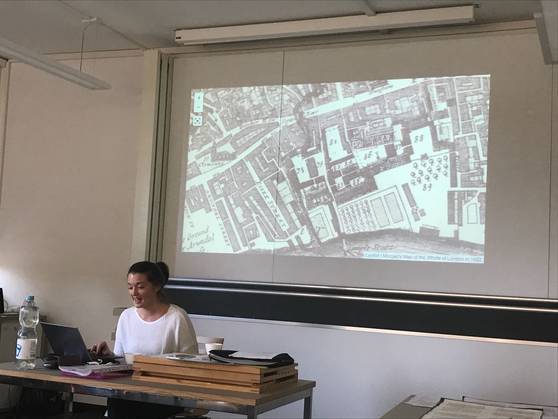
After a leisurely start on Saturday morning, we addressed the issue of annotation, with questions such as how detailed they should be, how much foreknowledge on the reader’s part they should assume, and how they might differ, depending on whether an edition is addressed to undergraduates, MA students, or researchers. Considering the examples of the prologue of Behn’s The Rover and sections from Sir Patient Fancy, we were again given an opportunity to exercise our own judgment. Finally, we were also introduced to and pooled together a number of resources on which one might draw in order to retrieve the necessary information to annotate obscure passages in early modern texts, ranging from early modern newspapers to (at times quite colourful) legal records. For lunch, we headed down to the Sarine for a lavish picknick by the riverside, where we enjoyed the beautiful autumn weather and all sorts of local cheese.
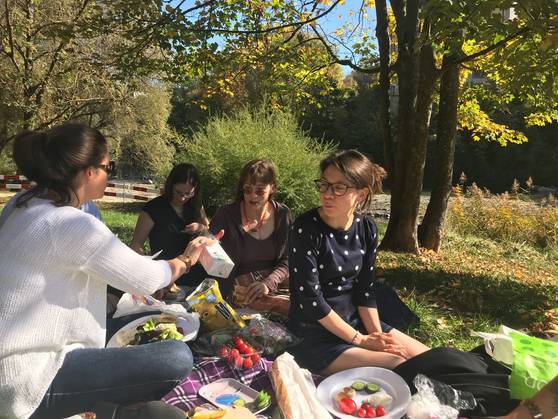
In the afternoon, Dr. Maria Shmygol, Dr. Rahel Orgis, and Dr. Florence Hazrat gave inputs on their current and prospective research projects, which stimulated a number of discussions on editorial choices and strategies as well as more diverse questions, ranging from the interpretation of punctuation in early modern printed texts to the writing of grant applications. After a coffee break, we returned once more to Aphra Behn and the issue of emendation. To what extent, for instance, can or should a critical edition intervene in the punctuation of the early modern printed text, or to what extent should it retain such aspects as the usually very generous and sometimes erratic early modern practice of type-setting in italics? Is faithfulness to the material witness paramount, or should a modern editor be allowed to remedy the infelicities of an early modern typesetter, which might otherwise obscure the literary text? Thoroughly sensibilised to the many difficult choices which an editor faces and the many decisions which they have to make, we finally concluded the workshop in the Café du Belvédère, with some further difficult choices to be made between the local craft beers.
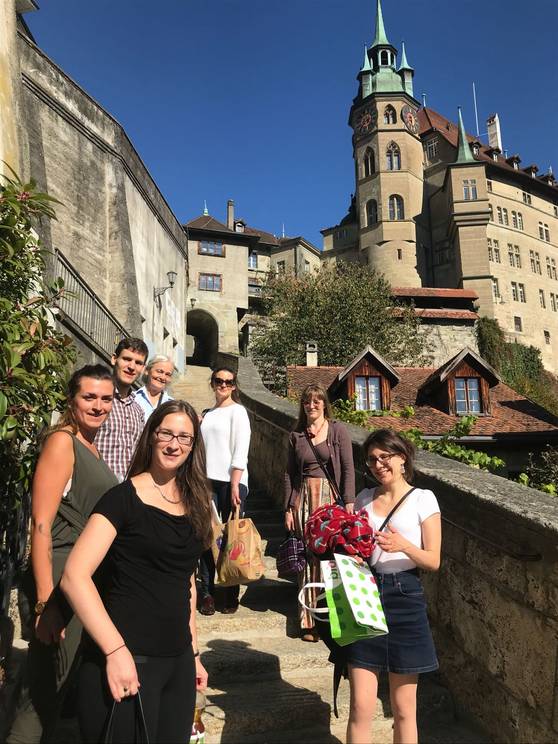
Many thanks go to Dr. Claire Bowditch and Prof. Elaine Hobby for sharing their work and expertise in this highly explorative, interactive, and, not least, entertaining workshop and to the organisers Dr. Emma Depledge and Anne-Claire Michoux for the smooth running of this intense and stimulating two-day event.
Fribourg, 30 April 2016: Medieval and Early Modern Studies Travelling Seminar: “How to Write a Life in Early Modern England” – a report by Kader Hegedüs, University of Lausanne
April 30, 2016. I took the train to Fribourg in the morning and, upon my arrival at the station, walked to the University. My mood had first been dampened by a strenuous week, but it quickly lightened when I was greeted with the comfort of friendly faces and warm coffee. We then proceeded to the adjacent building, in which we spent the rest of the day in the most fruitful and enriching discussions...
How to write a life in early modern England? What genres and formats constituted life-writing? What aspects of one’s life were these accounts primarily interested in? It is with these introductory questions that Professor Alan Stewart (Columbia University) did us the honor of leading the morning workshop of this CUSO travelling seminar. Looking at very different examples of life-writing (Richard Rogers’ diary, Margaret Cavendish’s autobiography, and John Aubrey’s biographical entries on Ben Jonson and Shakespeare), the discussion addressed their context of production and some of the challenges they pose for literary critics. From considerations on authorship, circulation and intended audience, the discussion naturally extended to the question of authorial intentionality: did these texts explicitly pursue the objective of writing “a life”? Did biographers write themselves into the lives they were claiming to retell? And to what extent did autobiographers attempt to fashion themselves through their writings?
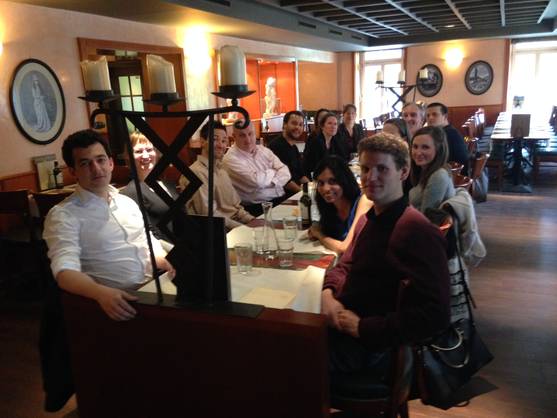
The two last questions were further explored, after a hearty lunch, in two presentations by Dr. Kirsten Stirling (UNIL) and Dr. Antoinina Bevan Zlatar (UZH). Kirsten Stirling, on the one hand, explored the interplays between images and texts, and demonstrated how biographers of John Donne (from Izaak Walton to modern scholars) have tended to adapt their ekphrasis of Donne’s portraits so that they would fit the rest of their particular biographical narrative. Antoinina Bevan Zlatar, on the other, looked at the political and religious components of Anne Clifford’s autobiographical writings, and in particular the discourses of dynasticism and providentialism she seemed to articulate in order to assert her own land claims.
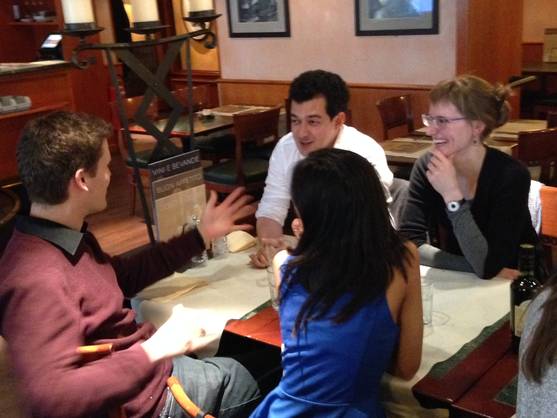
After a short coffee break, Alan Stewart concluded the seminar with a plenary lecture on the case of Richard Stonley, and the way this government official tried to make sense of his daily life by the intriguing format of his diary: to some extent influenced by the structure of almanacs, it was consistently organized in separate sections addressing spiritual (systematic references to psalms), routinely (daily events and anecdotes) and financial matters. This was thus the perfect opportunity to round up the day and to address not only the blurring of genres between biographical narrative, record keeping and spiritual exercise, but also the compartmentalization of the pieces of one’s life between private and public, professional and personal, and religious and secular.
The seminar was then followed by an apero at Indira Ghose’s beautiful place, where we celebrated Dr. Derek Dunne’s monograph publication Shakespeare, Revenge Tragedy and Early Modern Law: Vindictive Justice (Palgrave, 2016).
After my return home, I went to my study diligently and wrote down the events of that day. I gave thanks to Alan Stewart, Kirsten Stirling and Antoinina Bevan Zlatar for their fascinating talks, as well as to Derek Dunne and Indira Ghose for organizing this fine event, and then went straight to bed.
Fribourg, 12 March 2016: Medieval and Early Modern Studies Travelling Seminar: Religion and Early Modern Literature – A report by Oliver Morgan, University of Geneva
The visit of Brian Cummings (Anniversary Professor at the University of York) provided an opportunity to think through the complex relationship between religion and early modern literature in the company of one of the leading scholars in the field. A workshop in the morning focused on Erasmus’ Enchiridion—new to many of the participants—and produced a wide-ranging discussion on dualism, metaphor, and biblical exegesis.
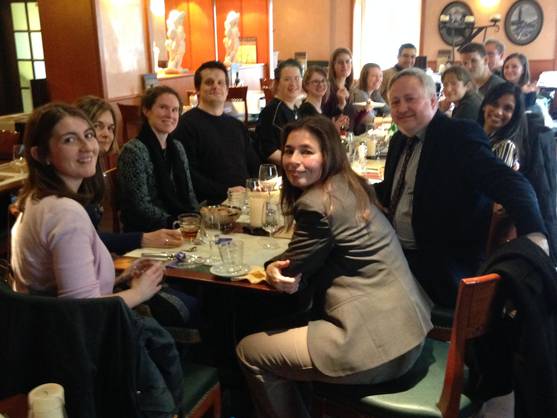
In the afternoon, Professor Cummings gave a lecture on a recently discovered English translation of the same text, thought to have been made by William Tyndale, showing how the problems encountered by the translator could be used to inflect some of the central debates of the Reformation. Sandwiched between these two slices of Erasmian bread was a fine paper from Kilian Schindler on heresy in A Midsummer Night’s Dream. The day ended, as is proper, in vinous mists and melted cheesiness.
Neuchâtel, 7 March 2015: CUSO Travelling Seminar in Medieval and Early Modern English Literature: Poetics – A Report by Azamat Rakhimov, University of Geneva
What’s in the form? A wide range of questions concerning the construction of early modern texts was at the core of the workshop that took place at the University of Neuchâtel on 7 March. As spring was about to change the beautiful shores of the Lake of Neuchâtel, professors and doctoral students from Geneva, Lausanne, Fribourg, Neuchâtel, and Berne gathered together in the brightly illuminated room to discuss the intricacies of the formal transformations of sonnets in the Jacobean and Elizabethan period. As it is often the case, heated discussions went beyond the announced topic and covered a wider field.
The workshop was divided into three parts, each devoted to a specific subject. Professor Russ McDonald from Goldsmiths College, University of London, gave start to the debates with his insightful seminar on a selection of texts from George Puttenham and George Gascoigne, which provided a framework for approaching the sonnets by Edmund Spenser, Michael Drayton, Philip Sidney, and William Shakespeare. Together with Professor McDonald, we attempted to explore carefully constructed layers of meanings hidden under the apparent and deceitful simplicity of patterns employed by the poets. It may seem that sonnets, either consisting of an octave and a sestet (Italian) or of three quatrains and a couplet (English), do not offer much variation because of the rigidity of form. However, as the seminar progressed, the participants discovered how early modern poets played with the form, exposed it, and used it for transmitting unconventional meanings.
Discussions were paused for a lunch break only to start again with vigour in the beginning of the afternoon. Alice Leonard, doctoral assistant at the University of Neuchâtel, gave a presentation entitled “Metaphor: Error or Poetry”. The topic was inspired by her doctoral dissertation which investigates the use of metaphors in Shakespeare, their power to clarify matters or, on the contrary, create ambiguities and cause confusions. Oliver Morgan, doctoral assistant from Geneva, was the one to take Alice’s place and lead our seminar towards the realm of Anthony and Cleopatra. His presentation dealt with the play of line and turn. Oliver focused on the matters of transition and turn-taking, its timing and formal representation that could contain metrically loaded signification.
After a short break, Professor McDonald invited us to enlarge our understanding of Shakespeare as Elizabethan stylist. Historical background and illustrious examples from the architecture of the period showed that the striving for formal organization permeated all forms of early modern art (and life): pleasure was found in the linear and harmonious organization of buildings, gardens, and, of course, poetry. The very structure of a sonnet, Professor McDonald argued, provided delight to the reader, and Shakespeare mastered the form. Rhythm was a vehicle for the delivery of the ideas and at the same time made speech harmonious. That cultural sensibility valued different patterns of language constructions, but it is virtually impossible to cover all of them in a short report. There is little doubt that you have Shakespeare’s sonnets at hand, hence, you may start enjoying their harmonies right now.
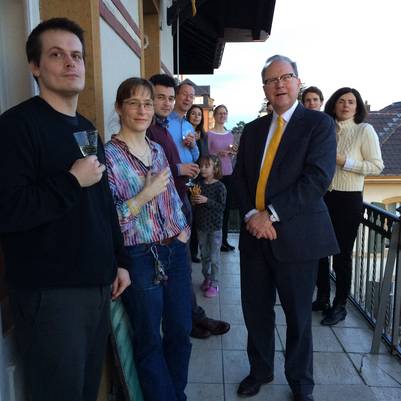
An informal apéro rounded off the day-long workshop devoted to form.
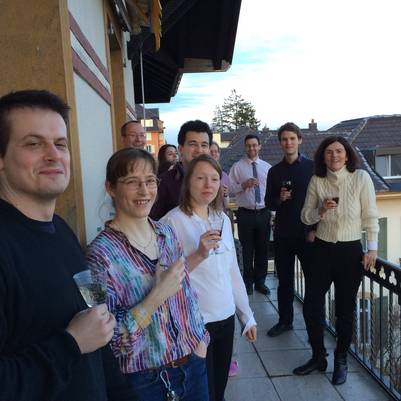
Geneva, 2-3 December, 2011: "Designing the Body: Interdisciplinary Approaches to Fashion" - a report by Sarah Brazil, University of Geneva
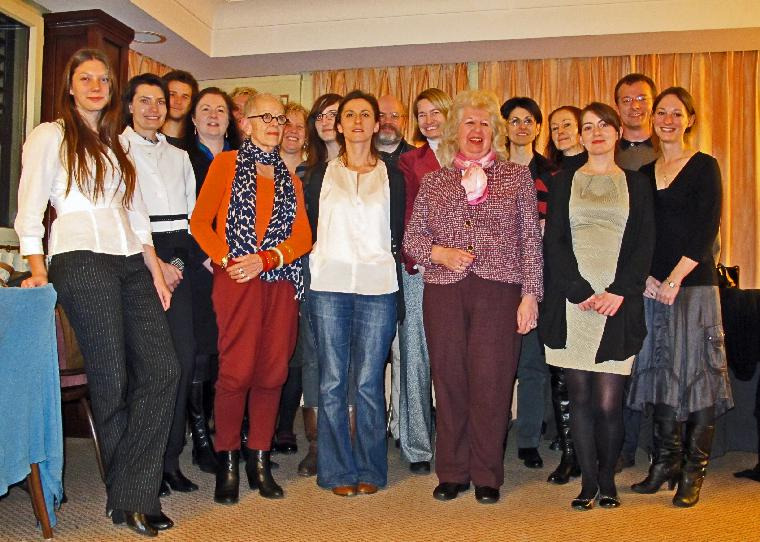
With interdisciplinarity as the key aim of this event, Professors Guillemette Bolens (Medieval Literature) and Deborah Madsen (American literature) of the University of Geneva organised a CUSO conference with quite an amenable topic to this: Designing the Body: Interdisciplinary approaches to Fashion. Taking place in Geneva on December 2&3, the stimulating aspect of this conference came from the vastly different perspectives being offered, with invited speakers Prof. Gale Owen-Crocker from the University of Manchester providing an archaeological reading of Anglo-Saxon clothing, while Prof. Elizabeth Wilson from the London School of Fashion presented a more theoretical position on the history of fashion.
Professor Owen-Crocker got things started on Friday morning with a lecture on the momentous achievement that she and a few colleagues have recently achieved: “Compiling the Encyclopaedia of Medieval Textiles of the British Isles: Sources and their Limitations”. Firstly discussing the problems involved with getting such a work published, finding the right scholars to do the job, and the obstacles that historical sources provide, Prof. Owen-Crocker gave us the inside on the forthcoming encyclopaedia which premises interdisciplinary approaches to clothing as a vital aspect of its compilation. We then moved on to the workshop led by Prof. Owen Crocker, “Dressing the Dead: Reconstructing Clothing from Grave-Goods” in which we discussed the grave finds of Anglo Saxons, and queried if it was possible to know how people dressed in their everyday life when we only have evidence from how they were dressed in death.
Three papers followed in the afternoon, with myself and Petya Ivanova continuing on in a medieval vein. I spoke about how to identify a knight in literary texts, noting the difficulty often deliberately provided by clothing and armour. Petya spoke on how fashioned ‘nude’ body of lady Bertilak is used in the Middle English poem Sir Gawain and the Green Knight to test the hero’s courtesy, and explored this through a kinaesthetic perspective. Anna Iatsenko then bridged the gap between medieval and modern with ease, speaking about the omnipresence of clothing in Toni Morrison’s novels as well as the significance of nudity as a means of conveying loss in works such as Jazz, Beloved and Love.
With a foot firmly in the modern, we began Saturday morning with a lecture from Prof. Wilson entitled “Fashion Theory Since the 1970s”, sketching out the beginnings of a long-neglected discipline, and the role that her own polemic Adorned in Dreams: Fashion and Modernity played in inciting debate between theoretical approaches and the costume historians who work with the materials themselves. Interesting conversations ensued, and we explored the reasons why fashion was so slow to emerge as a discipline in its own right, as well as the ways in which fashion is and has been often used as a scapegoat for societal ills, once again bridging the past and present.
Three more papers were delivered in the afternoon, with Arnaud Barras outlining the differing uses of clothing in Rudy Wiebe’s A Discovery of Strangers as being either sociocultural markers or homeostatic tools, and proffered that there was a reconciliation achieved between these two opposing uses and ideologies of clothing by English explorers and native Tetsot’ine hunter-gatherers in the Artic coast of modern day Canada. Michael Röösli’s paper ventured a reading of Chuck Palahniuk's novel Invisible Monsters through the lens of Foucault's notion of "technologies of the self" in order to investigate a contradiction between two dominant discourses in consumer society: on the one hand, there is a glorification of the self and its difference from the masses, and on the other hand, the very goal of being fashionable is to belong to a community, which is paradoxically to be achieved through mass-produced commodities. Kimberly Gaydon then finished proceedings with a genealogy of vampire fangs and their uses in British and American literature and cinema, arguing that it is the fangs of the vampire which define both the body of the vampire, and vampirism itself.
Discussion then had to be resumed over dinner, and our reflections on the past two days were greatly aided by good food and copious wine, continuing long into the night.
Zurich, June 17-19, 2011: “The Violence of Aesthetics - The Aesthetics of Violence” – a report by Michael Röösli, University of Geneva
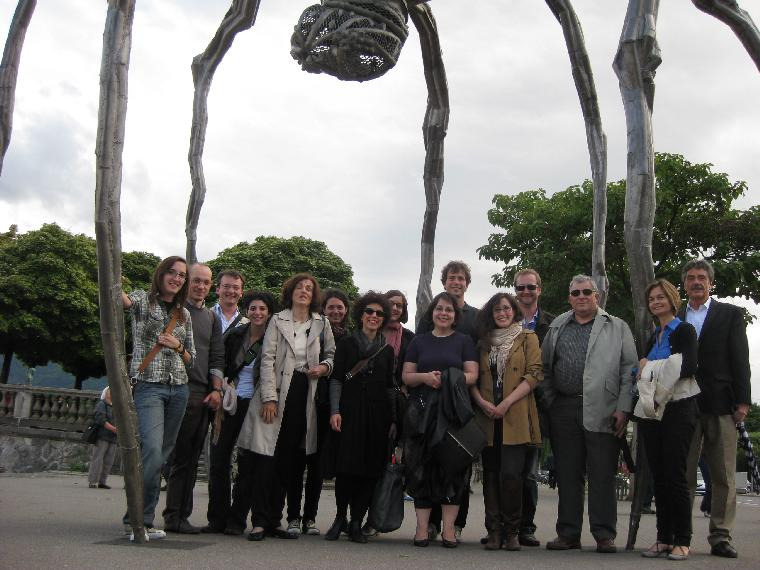
Prof. Elisabeth Bronfen (University of Zurich) and Prof. Margaret Tudeau-Clayton (University of Neuchâtel) co-organised the most recent conference of the CUSO doctoral programme for English language and literature. An unusually large number of students attended, and the lively exchanges as well as the buoyant atmosphereclearly indicated that the event was a great success.

The lecture by Prof. John Drakakis (University of Stirling) inaugurated the proceedings on Friday afternoon, confronting the group with a multitude of manifestations of violence. The presentation traced issues such as enjoyment, theatricality, and Dionysian creativity across Renaissance plays (such as The Revenger's Tragedy and King Lear) but also in non-fictional texts. An animated discussion ensued, which showed to what extent the talk had resonated with a great variety of research fields. The debate also spilled over into our contemporary mediascape, setting the early modern texts alongside cinema, wrestling and other cultural practices.

On Saturday, Prof. Andreas Höfele (University of Munich) examined the power relationships between people and sovereigns in the early modern period, paying particular attention to the issues of violence in representation and the public/private distinction in cases of executions. In the afternoon, Prof. Garrett Stewart (University of Iowa) initiated the contemporary part of the conference by taking a closer look at conceptual and epistemological violence. With a rich slide show of 'book sculptures' and their ways of questioning media boundaries or fetishisation of the book, he set out a framework which he then used for a close reading of Toni Morrison's novel Jazz and its negotiations between the textual space of the novel and the 'spatial text' that its reader occupies. In his workshop, Garrett Stewart used extracts from recent American war films, which confront the increasingly 'framed' and recorded (e.g. by mobile phones) experience of violence with an emergent digital cinematic paradigm. On Sunday morning, Dr. Bran Nicol (University of Portsmouth) looked at the genre of crime fiction as a form of seduction (borrowing this term in its not necessarily erotic definition from Baudrillard). Violence here emerged as a matter of an open aesthetic of a text (its productivity as opposed to its mere consumption) but also in terms of the contexts of a reading (what exactly distinguishes a lover from a stalker?).

Even the bad weather could do not dampen the relaxed atmosphere and exchanges among the workshop participants - be it during the discussions, over the wonderful meals, a night cap, or after a Hitchcock screening. The workshops themselves were also full of great moments and performances - for instance Prof. Höfele's meditation on what he declared the 'tea-cup style' of holding guns in earlier westerns (shooting from the hip), and the subsequent transformations of this cinematic code…. I also remember Saturday morning when Matthias and I were discussing on the tram to the English Department how we use violence in our own respective projects, when we suddenly realised the dead silence on the tram, and the somewhat strange stares of the other passengers. But I'm sure that not only the population of Zurich, but all doctoral students who attended the conference will remember the great event, their impressions and new ideas for a long time to come!
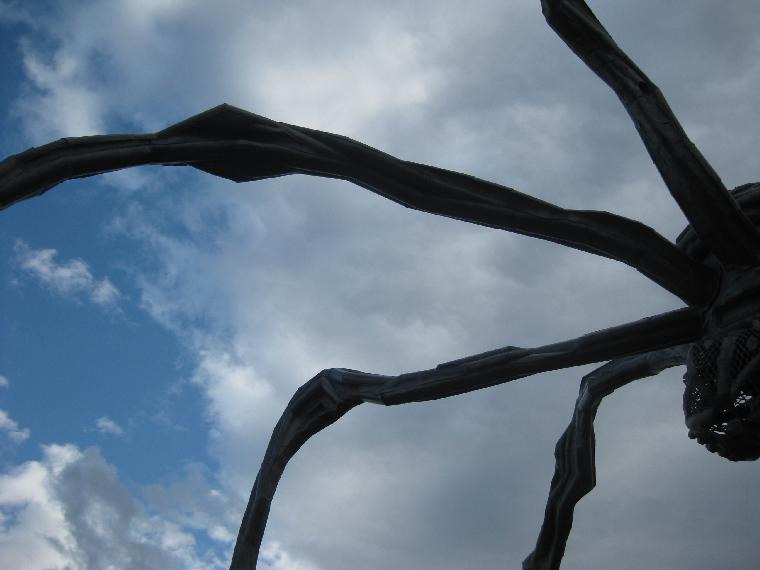
Crêt-Bérard, March 4-5, 2011: “Literature and Altered States” – a report by Joanne Chassot & Juliette Vuille, University of Lausanne
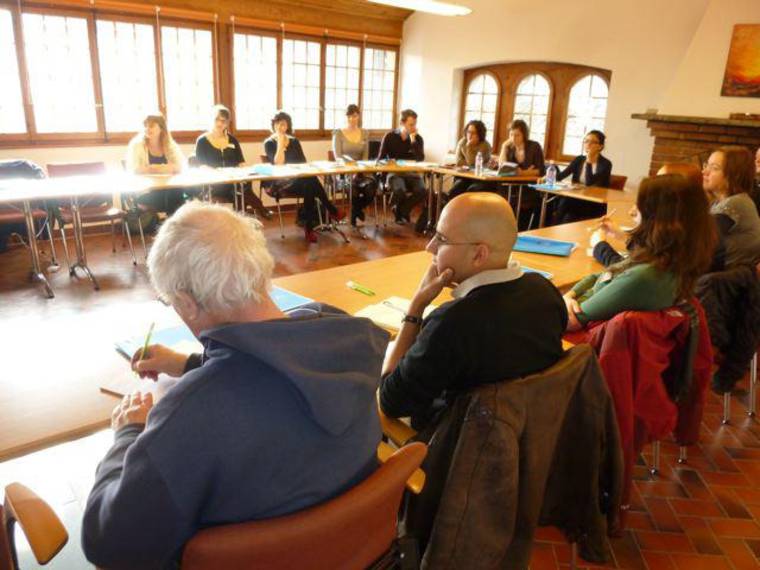
Profs Agnieszka Soltysik (American Literature) and Denis Renevey (Medieval English Lit.) undertook the bold project to organise a doctoral workshop that would bridge the temporal, cultural and conceptual gap between their respective fields. This workshop, entitled "Literature and Altered States of Consciousness" succeeded in unexpected and stimulating ways. The papers, workshops and meal-time discussions revealed several concepts which could be used to think about "Altered States" in any time period, such as "mimesis," "altered state and creativity," "questions of authorship and altered state," "repetition inducing trance in medieval liturgy and contemporary poetry."
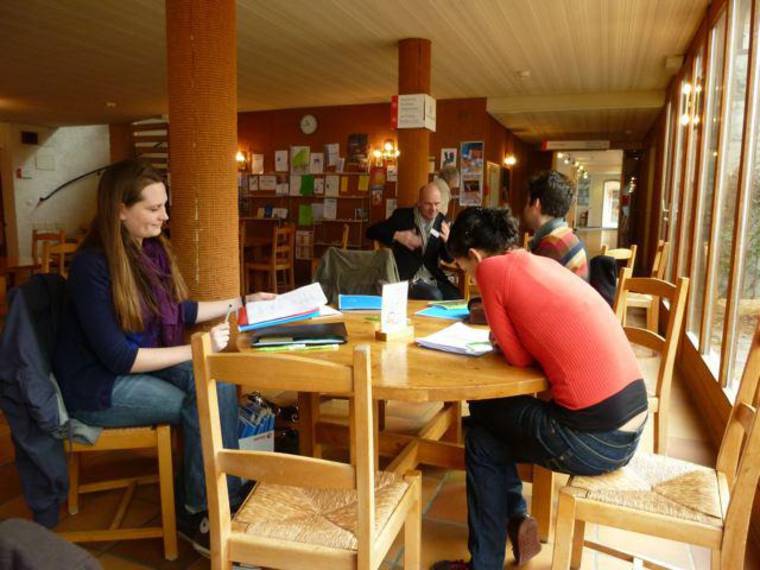
What quickly struck most of the participants was the interdisciplinary nature of the workshop, both in terms of the speakers’ diverse fields of research and in terms of the discussions that took place. The keynote speakers, coming respectively from neuroscience, theology and literature, offered three very different but complementary definitions of the notion of “altered states of consciousness.” Dr. Christian Lüscher (University of Geneva) presented his research on the neuro-chemistry of addiction and memory, and invited us to discuss if and how drugs of abuse (i.e. non-medically prescribed drugs) enhance creativity. Prof. Amy Hollywood (Harvard Divinity School) argued that in the medieval period, the Benedictine rule, which rendered every action a ritual action, was vital for the development of Christian mysticism, so that the constant repetition of psalms and prayers - someone else's words - could paradoxically lead one to reach a very individualized "altered state" of communion with the divine. Prof. Marcus Boon (York University) offered a wide overview of the relationship between drugs and literature (which he, as the very last speaker, adapted to better echo and build on the previous discussions), which he completed with a more detailed look at the Beats. While most of the other speakers came from the field of literature, their papers and the discussions that followed also repeatedly took us into the not-so-distant territories of theory, philosophy, history and psychology.
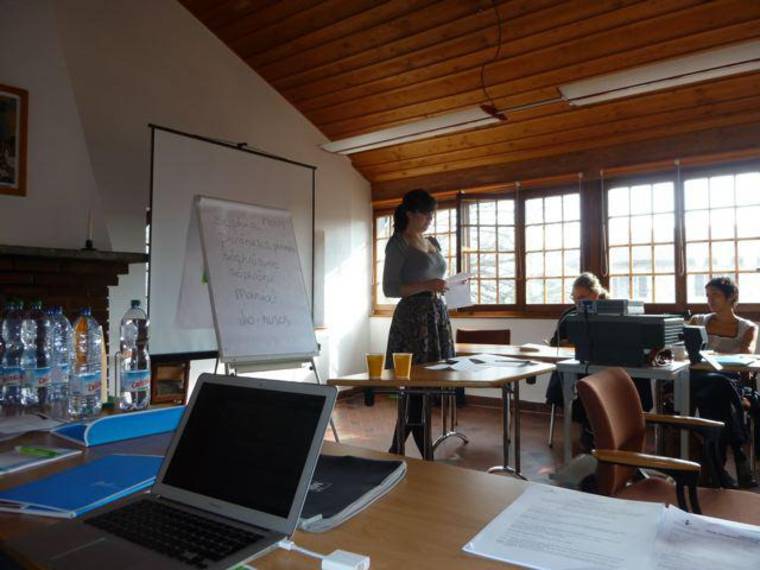
The great variety in the subjects presented in the other papers (half of which were offered by doctoral students), showed that the topic lends itself to rich and varied theoretical, historical and artistic treatments and can stimulate fruitful reflections about literature. These included discussions of the notion of mania in the theatre (Nidesh Lawtoo; Roelof Overmeer, Sarah-Jane Moloney and Michael Gröneberg), a mapping of Thomas De Quincey’s opium-induced “mental landscape” (Markus Iseli), and two critical discussions of modern readings of medieval instances of altered states (namely the “ecstasy” and superhuman force of the Berserker warriors in Viking Sagas [Roberto Biolzi] and the “madness” of female mystics [Juliette Vuille]) that echoed each other nicely. The three workshops were the occasion for making more connections. The first one, which followed Dr. Lüscher’s talk, was the opportunity for the literature people to eagerly ask all kinds of science-related questions, many of which the neuroscientist admitted he could not answer because they were way out of his field, permitting the attendants to realise the difference in outlook and method between literary and scientific scholars. The workshops with Amy Hollywood and Marcus Boon were restricted to doctoral and enthusiastic MA students which allowed for an informal and probably slightly less intimidating discussion. Prof. Hollywood's workshop, in particular, enabled students to draw enlightening parallels between practices of "altered states" in the medieval period and in contemporary poets, such as the comparable "collage" of psalms in Bernard of Clairvaux' Sermon on the Song of Songs and the literal "collage" of archival records of Susan Howe, and how these practices signify differently in the context of medieval and contemporary authorship. Prof. Boon's workshop, on the other hand, compared and contrasted two contemporary poems and the discussion yielded interesting conclusions in the ways that the poems reflected two different outlooks on "altered states" and drug use which corresponded to two different moments of the Beat movement. It was a nice opportunity to read and try to make sense together of some difficult texts.
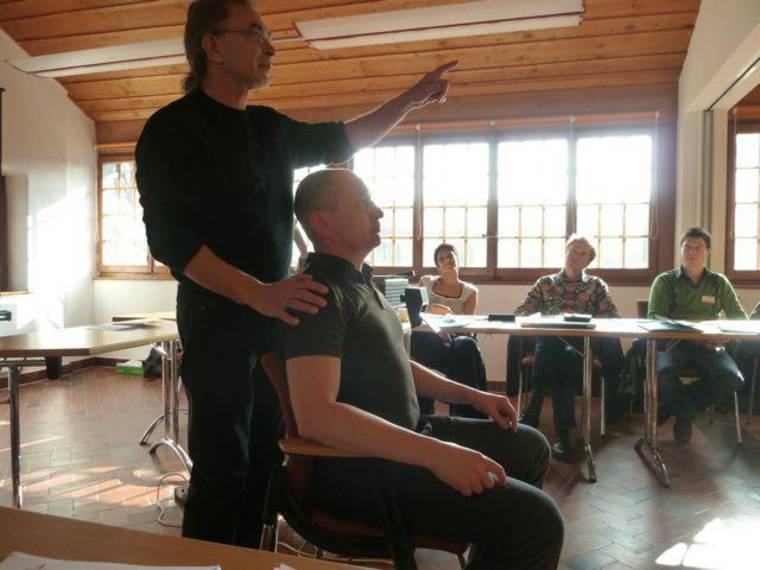
In his closing remarks, Prof. Renevey said that the two days had “altered” him, and that conferences are maybe the way for scholars to reach other states of consciousness that can stimulate their creativity. I (Joanne Chassot) often find myself frustrated and confused at the end of conferences and doctoral workshops, especially those that seem to me to be far from my own research interests. I approached this one as a tourist, with little expectation and no pressure to learn anything useful for my PhD project. I left with new interests and ideas for future reading, teaching and research. For my part (Juliette Vuille), this doctoral workshop gave me the opportunity to present a paper on an aspect of medieval mysticism that had always fascinated me, but which lay outside of my thesis' purview. The guest speakers were outstanding academics, and the fact that this was a doctoral workshop permitted much more interaction and fruitful discussions than would have happened in a conference environment. Finally, I learned a lot from the papers and workshops on contemporary American poetic movements, a subject on which I was utterly ignorant in the past, and the topical focus of the conference provided for very dynamic discussions and reflections.
